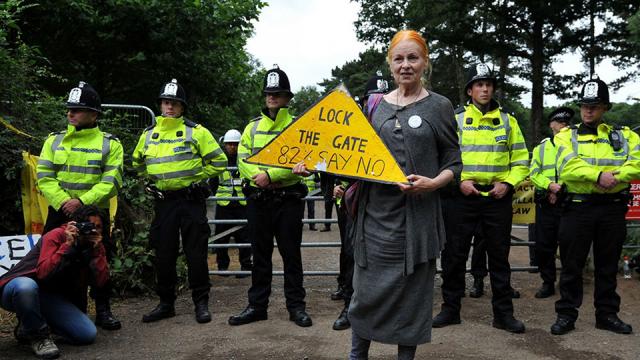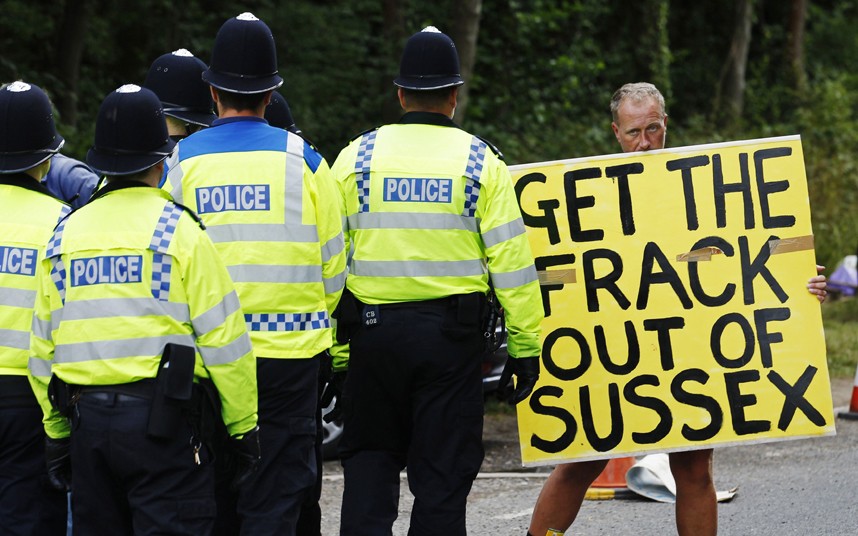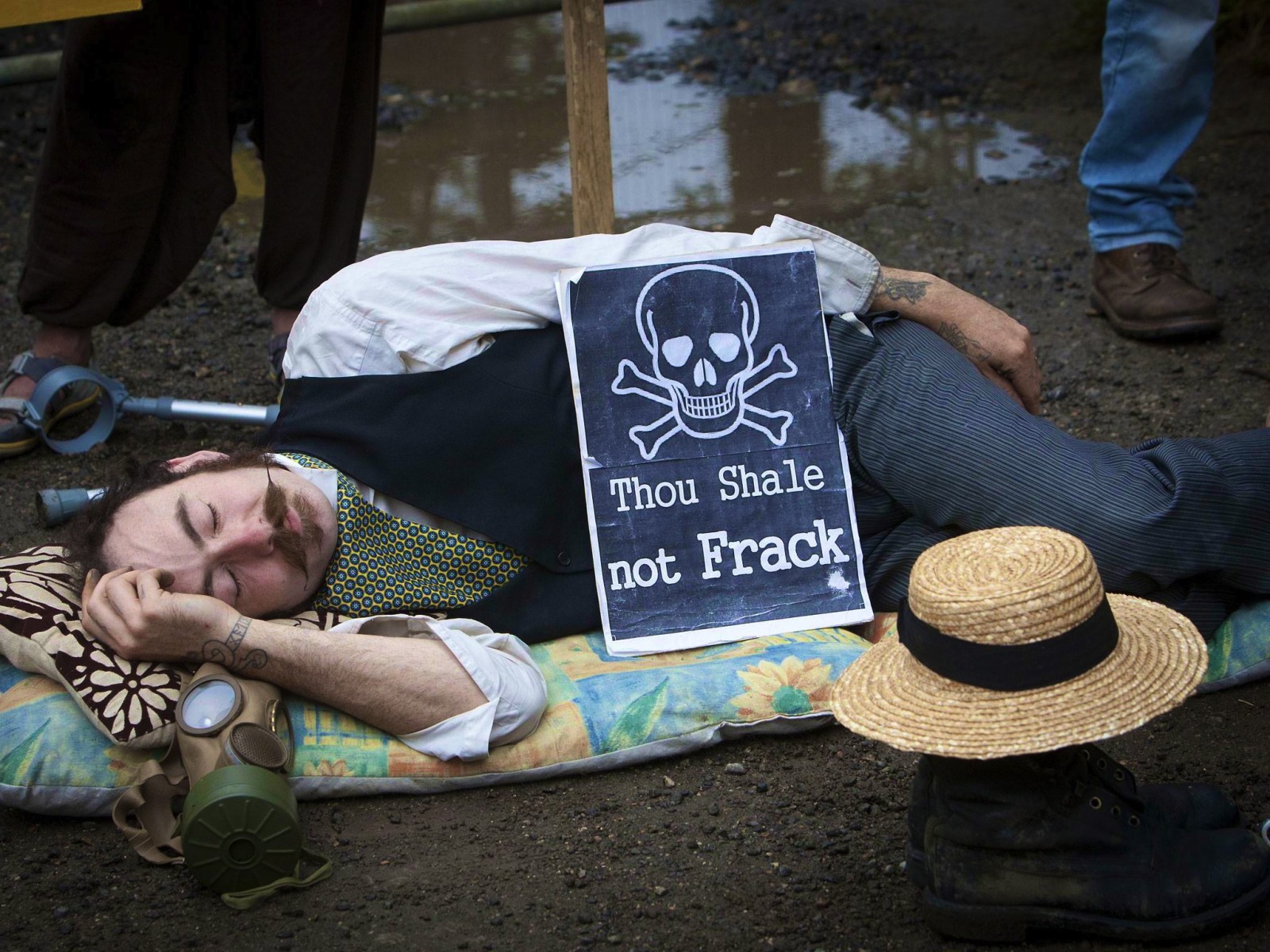
Fracking in Britain is dividing the Church of England.
Many of the Church's spiritual leaders and members oppose the industry’s plan for expansion across the UK, while the Church as a corporate entity will not rule out profiting from the potential industrial expansion on its British land.
“It risks damaging God's creation,” is the message from the Diocese of Blackburn, a church district from Northern England, where exploration was trialled and halted after earthquakes in 2011. Other Christians’ disapproval is shown in Balcombe, Britain’s current focal point for resistance.
Here, fracking company Cuadrilla’s exploratory work has been set back by broad opposition. A spiritual news platform Ekklesia celebrates how Christians joined the protection camp, while some were arrested in nonviolent direct action.
The Church of England’s corporate management asserts it is neither for nor against fracking. But despite this, its legal department undertook measures to ensure they can profit if it goes ahead on its land. Already in its investments, the Church profits from the practice, though this is information that has so far been overlooked or ignored in the British mainstream debate about whether the Church should condemn or bless fracking.
Its 2012 annual financial report shows the Church has invested £37.8 million in Royal Dutch Shell, which fracks in America. On top of this, the Church of England directs £32.9 million into HSBC, the bank used by British fracking company Cuadrilla. The Church’s third biggest corporate investment is BP – also involved in fracking in the US, Algeria, Indonesia and Oman.
Last month it was widely reported how the Church is in the process of meeting the nationwide October deadline to register its mineral rights claims. Like other landowners with a Middle Ages legacy, registration will ensure profits if its land is fracked. On top of this, they will collect the dues on the land they once owned. In UK terms this is significant as it amounts to potential mineral rights to over 500,000 acres of England – or 1.55% of the total country’s area.
Many regard the Church as an authority on moral issues, in England and across the Anglican denominations. Along with this, its judgement on issues is still relevant as it holds great power within Britain’s political landscape. For instance, the Church is granted 26 seats in the House of Lords, Britain’s unelected second chamber. These go to the most high ranking bishops and archbishops, who so far have always been male.
Church officials have responded to its apparent “fracking land grab” with a press release that states the Church “has no official policy for or against fracking.” This is a crucial document as it counters accusations about the Church's plans to frack its own land. It comes from the Church’s Mission and Public Affairs group, who hold responsibility for policy and the church’s official direction.
But closer scrutiny suggests its authors are pushing a pro-fracking agenda, which might in fact legitimize future fracking on its land. The document also does not reveal who the Church is already investing in concerning fracking worldwide.
Throughout the press release, the Church pushes for the fracking debate to be widened. It talks about fracking’s potential to lower fuel bills and solve fossil fuels shortages. Points taken straight from the fracking lobby’s hymn sheet, they directly contradict an Oxford University Institute for Energy Studies paper done on the subject.
The UK is connected to the Euro-Asian gas pipeline network, which means any increase in gas production will get absorbed and price reductions will be negligible. On top of this, demand is likely to increase, particularly from China, keeping gas prices rising in any case.
The Bishop of Chichester, Dr. Martin Warner, looks at the problem more broadly. He suggests instead that the Church should question humanity’s thirst for fossil fuels. He asks: “Is our present consumption of energy justifiable – not simply sustainable? And do we know what we shall say to the rising generation of 40 years time about the greed with which we have consumed the earth’s resources and left them with considerably less?”
While denying any plans to frack Church land, the press release promotes the idea that fracking is safe. It proclaims that with proper regulation, “fracking can be managed effectively,” echoing the dogma of the fracking lobby. As evidence, it quotes a Royal Academy of Engineering report. But the source cannot be viewed as independent or without a conflict of interest: the Royal Academy takes direct funding from the oil industry, including from companies involved in fracking.
The Academy's former president, Lord Browne, is owner and chairman of British fracking firm Cuadrilla, while the new president, Sir John Parker, worked for the oil firm Anglo American, which has fracking interests in South Africa.
In contrast, Blackburn’s local Church of England webpage and leaflet is explicit about fracking’s process and dangers. It discusses the way fracking involves the use of thousands of gallons of chemicals that are kept secret under trade laws, admitting “there are indications that at least some of this toxic cocktail makes its way back into the water supply.” The information also clarifies the other serious ecological and human impacts, including fracking’s intensive demand for clean water coupled with its contamination of aquifers, which makes a double strain on water availability.
The divergence between those leading the official Church’s policy on fracking, and its base religious ethics, become clearer through a quote given by Westley Ingram, one of the Christians arrested for taking direct action against Cuadrilla.
“A church that does not take a stand on climate change in the interests of the poor, at home and abroad, does not represent Jesus Christ," he said on the Ekklesia news platform. "A clean energy future is the only way to address fuel poverty."
Divisions over fracking share some similarities with the splits in the Church caused by the Occupy camp that was established at St Paul’s Cathedral. The camp drew greater attention to the ties between St. Paul’s Cathedral and the City of London, and some Cathedral officials worked actively to remove the camp.
But many regular Church members and spiritual leaders took the opposite view, calling on the Church hierarchy to “throw the money lenders out of the temple.” Christian congregation members were arrested praying when the camp was evicted.
Divestment from unethical corporations is a slow process for the Church of England, but it appears to be a process that is in fact moving. It was only in 2000 that the Church decided to ban investing in arms sales, following years of pressure from the Campaign Against the Arms Trade.
Earlier this year, the Church caused controversy due to its financial interests in payday loans. In response, it now actively supports local credit unions. For it to divest completely from fracking will take a far larger campaign forcing the corporate side of the Church to convert its investments. Only strong pressure from the clergy, members and society at large will ensure that the Church’s land is not fracked.
3 WAYS TO SHOW YOUR SUPPORT
- Log in to post comments















